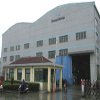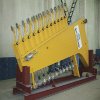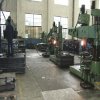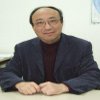Expanding to meet the growing demand
14 June 2010When its cooperation arrangement with a Chinese machinery manufacturing company came to an end, Siempelkamp set up its own workshop in Wuxi, two hours’ drive from Shanghai in Jiangsu Province, opening its doors in July 2004.
Today the Wuxi facility employs 197 people and manufactures a range of machinery and parts for its customers in the Chinese market.
Of course the company has for a long time also had offices in Beijing, where a total of seven staff handle sales on behalf of Siempelkamp headquarters in Krefeld, in the industrial heartland of Germany; and are responsible for after-sales service.
The two after-sales service engineers based in Beijing work directly for the Wuxi factory while the sales people report to Krefeld.
The general manager of the Wuxi operation, Meng Xiancang, who is fluent in German, set up the operation back in 2004 and was responsible for choosing its location.
Mr Meng explained his reasons for choosing the site on a large industrial complex in Wuxi.
“Historically, Wuxi is an industrial city specialising in machinery production and is well-developed. It was thus easy to find experienced technicians to work with us,he said. “Also, it is close to the major city of Shanghai, which is an international city with a good transport infrastructure, customs clearance systems and govern- ment support. Other considerations were that the labour rates are comparatively economic here, compared to metropolitan Shanghai, and the sea port is very important to us and close.
“There were of course other candidate cities and we made a list, but chose Wuxi and it has been proved that we chose wisely,said the general manager.
The current workshops cover an area of 12,000m2 in three buildings, but Siempelkamp is to expand this by moving to a new location nearby, where it will have 20,000m2 under one roof. The work- force will then increase to 500. An investment of one million euros is planned in Wuxi for 2010 and work was scheduled to begin on this move in June/July this year, said Mr Meng when interviewed at his workshops in March.
Machinery currently made at Wuxi includes part of the forming line for MDF lines; cut-to-size lines; cooling stars; and conveyors and packaging lines, with automated stacking if required.
On the larger scale, the factory also makes multi-opening and short-cycle presses.
The signature Siempelkamp ContiRoll continuous presses are still manufactured in the Krefeld factory but Wuxi does produce what Mr Meng referred to as “non-key componentsfor the ContiRoll for Chinese orders.
“We discuss with the customer, together with Krefeld, which parts of a line will be in our scope of supply and which will come from Germany and the decision is between us and the customer, explained Mr Meng.
The main installation work for all ContiRolls in China is the responsibility of engineers from Krefeld, assisted by local Chinese technicians under their control.
Wuxi is essentially expert in metal working and mechanical engineering. It has no involvement in electrical work, which is, currently at least, handled by Krefeld technicians.
“Spare parts for machinery originating in Germany are handled by Germany, while spares for machines made here are our responsibility,said Mr Meng.
I also met with Heinz Classen, managing director of Siempelkamp Maschinenund Anlagenbau GmbH & Co KG, at the WMF exhibition in Beijing in March and he provided some more detail on the Krefeld/Wuxi relationship in the wider context of the diverse activities of the Siempelkamp group outside wood based panels, including its foundry activities.
“In addition to our activities related to the wood based panels market, which will form 80% of the business, automation systems for the automotive industry and handling equipment for heavy foundry equipment will also be made in Wuxi,said Mr Classen. “We plan to make Wuxi one of our global regional centres and to give it more autonomy. We are already training more high-level staff for that purpose.
“It is unusual anywhere in the world to have a company which can cast, machine, fabricate and engineer and assemble machinery. Siempelkamp can do all those things.”
Of course cooperation does not just involve Krefeld. The Siempelkamp group is growing all the time, with the acquisition of a number of its specialist supplier companies.
“In the wood industry, we have changed our company structure,said Mr Classen. “Where products used to be made by companies in which we had a minority share, we are now bringing those companies into the group so that we can influence the whole line and reduce our costs.”
For instance, it has taken control of CMC Texpan of Italy, in which it has held shares for many years. Texpan is a specialist in forming systems but is increasingly taking on responsibility for other areas of Siempelkamp’s business, such as screens, sifters and blenders, and plans to increase its cooperation with Wuxi to sell its products into the China market, possibly with some local manufacture of components in Wuxi.
Chipper and flaker manufacturer Hombak of Germany also joined the Siempelkamp fold in 2009 and its products too are to be licensed to CMC Texpan in Italy as a main engineering centre for the group.
“Our main focus in China at the moment is the four feet wide ContiRoll,said Ralf Griesche from Siempelkamp Krefeld, who also attended the WMF show. “There is still a good market for this smaller continuous press because of the shortage of wood raw material in China which requires decentralisation of production of panels. Typical capacity of one of these presses is 400 to 600m3/day and it has all the features of the eight to twelve feet wide presses, with flexible infeed and so on.”
Back in Wuxi, Mr Meng is preparing for the big move and is looking forward to Wuxi’s increasing role within the Siempelkamp group.
“We will have our own products and our own sales team in Wuxi, as well as supporting Krefeld. We will expand the factory and reinforce our management,he said.
"We have a very good market in China and have had difficulty in keeping up with the orders.”



